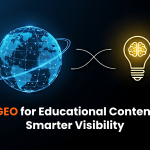Introduction
Search engines have always been the gateway to information. From keyword-based queries in the early 2000s to today’s sophisticated ranking algorithms, the way we search has evolved dramatically. But now, a disruptive force has entered the scene—Generative AI. Unlike traditional algorithms that only retrieve information, generative AI can create content, answer questions conversationally, and even anticipate user intent.
For businesses, marketers, and SEO professionals, this raises urgent questions: How will generative AI change search engines? Will SEO become obsolete? And what strategies can ensure visibility in this new digital era?
In this blog, we’ll explore how generative AI is revolutionizing search engines, answer frequently asked questions, and provide actionable strategies to future-proof your online presence.
The Impact of Generative AI on Search Engines
1. From Retrieval to Generation
Traditional search engines rank and display links. Generative AI goes beyond that—it provides direct, conversational answers. For example, instead of listing “best marketing tools in 2025,” AI could generate a personalized summary of the top tools, saving users time. This means businesses must optimize not only for clicks but also for AI-driven summaries.
2. Enhanced Personalization
Generative AI analyzes user behavior, history, and intent to deliver hyper-personalized search results. According to Gartner, by 2026, 60% of online users will expect search engines to deliver results tailored to their needs instantly. SEO strategies must therefore focus on audience segmentation, intent-driven content, and context awareness.
3. Shift in SEO Value
Keywords still matter, but context, authority, and engagement signals now carry more weight. Generative AI favors websites that are:
- Authoritative (expert insights, trustworthy sources)
- Engaging (longer user interactions, lower bounce rates)
- Fresh (frequently updated with relevant content)
This requires brands to move beyond keyword stuffing and focus on thought leadership and real value delivery.
4. Voice and Conversational Search
With AI-driven assistants like ChatGPT, Bard, and Perplexity, more users are turning to voice-based queries. This trend forces businesses to optimize for conversational SEO, long-tail keywords, and natural language.
5. Visual and Multimodal Search
Generative AI integrates text, images, and video into search results. Google’s Multisearch and Bing AI already allow users to search using images combined with text. Marketers should consider visual SEO, ensuring that videos, infographics, and product images are optimized for discovery.
6. Trust and Accuracy Concerns
While AI-generated responses are fast, they aren’t always accurate. This creates both risks and opportunities. Websites that establish authority and credibility will become essential sources AI models rely on. Fact-checking, data-driven insights, and trustworthy citations will set brands apart.
7. New Monetization Models
Generative AI may reduce the visibility of traditional ads. As a result, companies must invest in content partnerships, AI-integrated ads, and brand collaborations to remain relevant in AI-driven search experiences.
Frequently Asked Questions
Q1: Will SEO die because of generative AI?
No. SEO is evolving, not dying. Instead of optimizing for search rankings alone, businesses must now optimize for AI-driven content consumption, focusing on authority, relevance, and credibility.
Q2: How will generative AI affect website traffic?
AI-powered summaries may reduce clicks, but high-value content can still drive traffic. Websites that provide in-depth, unique insights are more likely to be featured in AI-generated answers.
Q3: Should businesses still invest in keyword strategies?
Yes, but with a shift. Keywords remain relevant for AI training data, but context, semantic optimization, and topic clusters are even more critical.
Q4: How can brands stay ahead in an AI-powered search landscape?
Brands must create multi-format content, leverage structured data, and prioritize brand authority. Investing in original research, expert interviews, and interactive content ensures AI recognizes your business as a trusted source.
Q5: What industries are most impacted by AI in search?
Industries like e-commerce, healthcare, finance, education, and travel face the biggest shifts, as consumers demand instant, accurate, and personalized information. Businesses in these sectors must act quickly to adapt.
Actionable Insights for Businesses
- Focus on E-E-A-T (Experience, Expertise, Authoritativeness, Trustworthiness): Search engines increasingly rank based on credibility, not just keywords.
- Use Structured Data Markup: Help AI models understand your content more clearly.
- Diversify Content Formats: Create blogs, videos, infographics, and podcasts to capture multimodal search.
- Invest in AI-Enhanced Tools: Platforms like Surfer SEO, Clearscope, and Jasper AI can guide optimization.
- Prioritize Human-AI Collaboration: AI may generate summaries, but human storytelling builds emotional connections.
Conclusion
Generative AI is not just a trend—it’s a revolution reshaping the way people interact with search engines. For businesses, this change represents both challenges and opportunities. The brands that succeed will be those that embrace authority-driven content, personalization, and innovative SEO strategies while maintaining trust and credibility.
The future of search is conversational, multimodal, and AI-enhanced. The question is: Are you ready to adapt?





